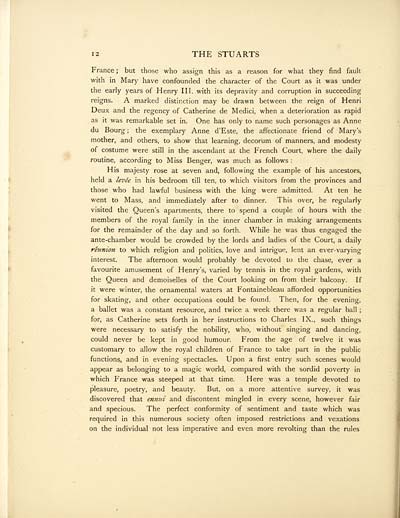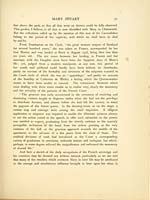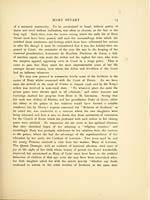Stuarts
(34) Page 12
Download files
Complete book:
Individual page:
Thumbnail gallery: Grid view | List view

12 THE STUARTS
France ; but those who assign this as a reason for what they find fault
with in Mary have confounded the character of the Court as it was under
the early years of Henry III. with its depravity and corruption in succeeding
reigns. A marked distinction may be drawn between the reign of Henri
Deux and the regency of Catherine de Medici, when a deterioration as rapid
as it was remarkable set in. One has only to name such personages as Anne
du Bourg ; the exemplary Anne d'Este, the affectionate friend of Mary's
mother, and others, to show that learning, decorum of manners, and modesty
of costume were still in the ascendant at the French Court, where the daily
routine, according to Miss Benger, was much as follows :
His majesty rose at seven and, following the example of his ancestors,
held a levie in his bedroom till ten, to which visitors from the provinces and
those who had lawful business with the king were admitted. At ten he
went to Mass, and immediately after to dinner. This over, he regularly
visited the Queen's apartments, there to spend a couple of hours with the
members of the royal family in the inner chamber in making arrangements
for the remainder of the day and so forth. While he was thus engaged the
ante-chamber would be crowded by the lords and ladies of the Court, a daily
rhmion to which religion and politics, love and intrigue, lent an ever-varying
interest. The afternoon would probably be devoted to the chase, ever a
favourite amusement of Henry's, varied by tennis in the royal gardens, with
the Queen and demoiselles of the Court looking on from their balcony. If
it were winter, the ornamental waters at Fontainebleau afforded opportunities
for skating, and other occupations could be found. Then, for the evening,
a ballet was a constant resource, and twice a week there was a regular ball ;
for, as Catherine sets forth in her instructions to Charles IX., such things
were necessary to satisfy the nobility, who, without singing and dancing,
could never be kept in good humour. From the age of twelve it was
customary to allow the royal children of France to take part in the public
functions, and in evening spectacles. Upon a first entry such scenes would
appear as belonging to a magic world, compared with the sordid poverty in
which France was steeped at that time. Here was a temple devoted to
pleasure, poetry, and beauty. But, on a more attentive survey, it was
discovered that ennui and discontent mingled in every scene, however fair
and specious. The perfect conformity of sentiment and taste which was
required in this numerous society often imposed restrictions and vexations
on the individual not less imperative and even more revolting than the rules
France ; but those who assign this as a reason for what they find fault
with in Mary have confounded the character of the Court as it was under
the early years of Henry III. with its depravity and corruption in succeeding
reigns. A marked distinction may be drawn between the reign of Henri
Deux and the regency of Catherine de Medici, when a deterioration as rapid
as it was remarkable set in. One has only to name such personages as Anne
du Bourg ; the exemplary Anne d'Este, the affectionate friend of Mary's
mother, and others, to show that learning, decorum of manners, and modesty
of costume were still in the ascendant at the French Court, where the daily
routine, according to Miss Benger, was much as follows :
His majesty rose at seven and, following the example of his ancestors,
held a levie in his bedroom till ten, to which visitors from the provinces and
those who had lawful business with the king were admitted. At ten he
went to Mass, and immediately after to dinner. This over, he regularly
visited the Queen's apartments, there to spend a couple of hours with the
members of the royal family in the inner chamber in making arrangements
for the remainder of the day and so forth. While he was thus engaged the
ante-chamber would be crowded by the lords and ladies of the Court, a daily
rhmion to which religion and politics, love and intrigue, lent an ever-varying
interest. The afternoon would probably be devoted to the chase, ever a
favourite amusement of Henry's, varied by tennis in the royal gardens, with
the Queen and demoiselles of the Court looking on from their balcony. If
it were winter, the ornamental waters at Fontainebleau afforded opportunities
for skating, and other occupations could be found. Then, for the evening,
a ballet was a constant resource, and twice a week there was a regular ball ;
for, as Catherine sets forth in her instructions to Charles IX., such things
were necessary to satisfy the nobility, who, without singing and dancing,
could never be kept in good humour. From the age of twelve it was
customary to allow the royal children of France to take part in the public
functions, and in evening spectacles. Upon a first entry such scenes would
appear as belonging to a magic world, compared with the sordid poverty in
which France was steeped at that time. Here was a temple devoted to
pleasure, poetry, and beauty. But, on a more attentive survey, it was
discovered that ennui and discontent mingled in every scene, however fair
and specious. The perfect conformity of sentiment and taste which was
required in this numerous society often imposed restrictions and vexations
on the individual not less imperative and even more revolting than the rules
Set display mode to:
![]() Universal Viewer |
Universal Viewer | ![]() Mirador |
Large image | Transcription
Mirador |
Large image | Transcription
Images and transcriptions on this page, including medium image downloads, may be used under the Creative Commons Attribution 4.0 International Licence unless otherwise stated. ![]()
| Histories of Scottish families > Stuarts > (34) Page 12 |
|---|
| Permanent URL | https://digital.nls.uk/95239459 |
|---|
| Description | A selection of almost 400 printed items relating to the history of Scottish families, mostly dating from the 19th and early 20th centuries. Includes memoirs, genealogies and clan histories, with a few produced by emigrant families. The earliest family history goes back to AD 916. |
|---|

